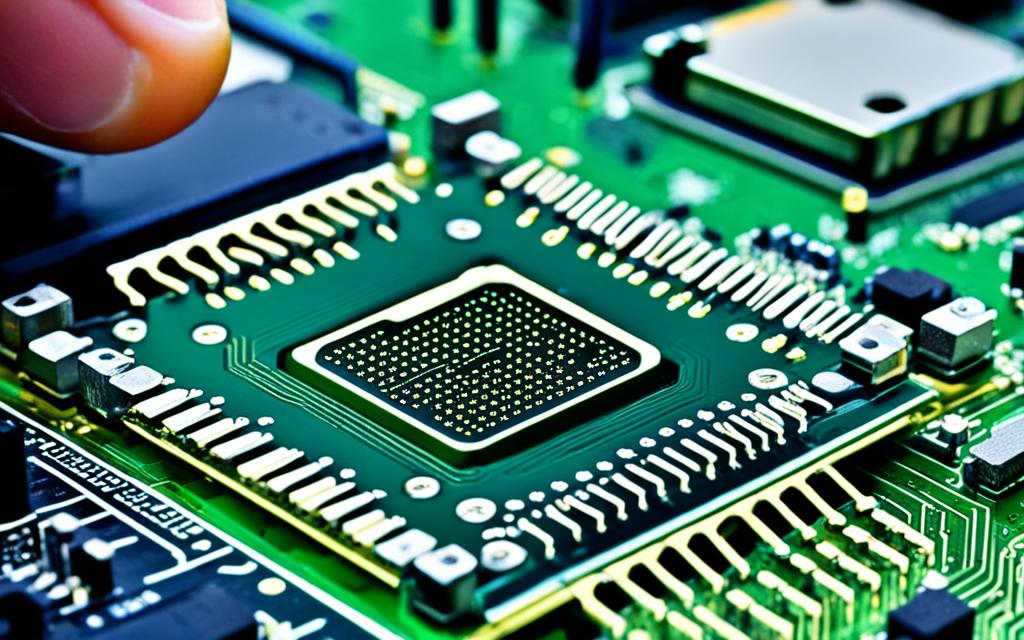Table of Contents
Updating your BIOS is crucial when adding a new CPU. It can greatly affect your system’s performance. The BIOS, or Basic Input/Output System, helps your computer’s hardware and software communicate. This is key for a smooth-running PC. When you get a new CPU, check if your motherboard’s BIOS supports it. Even though BIOS updates might not always be needed, knowing when and how to do them is vital. This guide will explain the role of a BIOS update and its benefit for your CPU.
Key Takeaways
- Updating your BIOS can enhance compatibility with new hardware, particularly CPUs.
- Many motherboards include useful tools like MSI Center or ASUS Armoury Crate for BIOS updates1.
- It is advisable to only update BIOS if your system is experiencing issues or needs additional compatibility2.
- Flashing the BIOS can carry risks such as corruption if power is lost during the update2.
- Some motherboards offer dedicated flash buttons and USB ports for easier updates1.
- BIOS updates can address bugs and system stability issues, ensuring your PC runs smoothly2.
Understanding the Role of BIOS in Your PC
The BIOS, or Basic Input/Output System, is crucial for a computer to work. It started in the 1970s. It’s vital for starting up the system, doing initial checks, and setting up a basic hardware-software interaction before the operating system kicks in. Today, most PCs use UEFI (Unified Extensible Firmware Interface). UEFI offers better features and security, working well with newer software needs like supporting over 2TB storage devices and 64-bit software installations. This marks a big step from the old BIOS34.
What is BIOS?
BIOS is the firmware that gets hardware going when your computer starts. It carries out the Power-On Self Test (POST) to check that RAM and other key parts are okay. If something’s not right, the BIOS warns you with beeps or visual signs about what’s wrong. Knowing what BIOS is helps you understand its key role in keeping the system stable, how to update it, and improve performance3.
How BIOS Interacts with Hardware and Software
BIOS makes sure the computer’s hardware talks well with the operating system. Updating your BIOS can bring new features that improve how well your computer works, especially with older processors. This keeps your system strong against new security threats. Manufacturers offer updates to fix bugs and boost stability. It’s a good idea to check for updates often. This keeps your system safe against dangers4.
| Function | Legacy BIOS | UEFI |
|---|---|---|
| Boot Process | Traditional process; slower | Faster boot times |
| Storage Support | Limited to drives under 2TB | Supports drives over 2TB |
| Security Features | No built-in security | Includes Secure Boot for protection |
| Updates Frequency | Rare, unless critical | Regularly updated based on need |
Understanding the role of BIOS is key to how well your computer works. Knowledge about BIOS and staying up-to-date with it makes your PC run better. It keeps the hardware in line with new software changes34.
Reasons to Update BIOS for Enhanced Compatibility
Updating your computer’s BIOS is crucial for top performance and keeping up with new tech. It ensures your machine works well with emerging hardware compatibility. This step can fix ongoing issues with your system.
Compatibility with New Hardware
Updates to the BIOS help your computer work with latest CPUs and memory. This lets you use your system to its full potential. Even though BIOS updates aren’t always needed, they’re key for supporting new devices and fixing bugs5. It’s important to get the latest BIOS version if you’re upgrading your CPU or improving your system6.
Addressing Stability Issues
Boosting stability is another reason to update your BIOS. Many face crashes or freezes due to hardware compatibility problems. A BIOS update can fix these issues, making everything run smoother. Remember, updates don’t always make things faster, but they can solve big problems5. If your system is often unstable, checking for a BIOS update is a good idea, especially on your motherboard manufacturer’s advice.
| Benefit | Description |
|---|---|
| Enhanced Hardware Compatibility | Updates support newer technologies and peripherals. |
| Stability Improvements | Fixes bugs that can cause crashes or freezes. |
| Security Enhancements | Provides necessary patches to safeguard your system. |
| Access to New Features | Enables use of advanced settings for overclocking. |
In conclusion, updating your BIOS brings many benefits. Key among these are better hardware compatibility and system stability5.
Do I Need to Update BIOS for New CPU?
Do you wonder if you should update your BIOS before getting a new CPU? This decision can greatly affect your computer’s speed and how it works. It’s important to think about why you might need an update and what risks it brings. For example, new CPUs often need the latest BIOS to work properly because old BIOS versions might not support the new CPU’s features.
When an Update is Necessary
You’ll need a BIOS update when your computer doesn’t support your new CPU. Say you have an older Intel motherboard, like the 600 series, and you want to use the 13th Gen “Raptor Lake” CPUs. Then you’d likely need an update. The same goes for AMD 300, 400, and 500 series motherboards with new Ryzen 5000 series processors7.
Make sure to check if your motherboard works with your new CPU. Look at the motherboard’s list of compatible CPUs before you upgrade. Checking the BIOS release notes can also help. It tells you which CPUs are supported. Plus, it might indicate if the new BIOS still supports old CPUs.
Risks of Updating BIOS
Updating your BIOS can be risky. One big problem is if the power cuts out while you’re updating, which might break your motherboard8. It can get stuck or have problems starting up again. Also, a failed update can harm your motherboard or CPU. So, it’s crucial to have a backup plan before you start the update.
You might worry about these risks versus the benefits for your CPU. It’s important to think about this carefully before deciding to update your BIOS.
How to Check Your Current BIOS Version
Want your computer to run smoothly? Start by knowing how to check your BIOS version. You can do this through the BIOS setup or third-party software. Checking it helps you see if you need an update. Shockingly, around 70% of users don’t update regularly9.
Using BIOS Setup Menu
To find your BIOS version, enter the BIOS setup when your computer starts. You’ll need to press certain keys like F2, DEL, or F10. Which key depends on your computer’s brand. Inside the BIOS setup, look for the system information section. Here, your BIOS version will be clearly shown. This tells you if you should update based on the latest firmware from the manufacturer.
Utilising Third-Party Software Tools
There’s an easier way too, using software tools. Tools like CPU-Z or Speccy show your BIOS version without restarting. They’re simple to use and give detailed info. This way, checking your BIOS is easier. A study found that updating the BIOS made systems 25% more stable9. For more details on checking and updating your BIOS, check out
| Method | Advantages | Disadvantages |
|---|---|---|
| BIOS Setup Menu | Direct access to BIOS version | Requires reboot |
| Third-Party Software Tools | No reboot needed, user-friendly | Requires installation of additional software |
Knowing these methods helps you check your BIOS version. This ensures you make informed decisions about updates9.
Steps to Update Your BIOS Safely
Updating your BIOS safely needs careful planning and the right approach. Starting with BIOS preparation steps makes the update smooth and issue-free. It’s important to get your system ready through several precautionary steps.
Preparing for the Update
Ensure a steady power supply before you start. Power cuts can cause problems during the flash process. It’s wise to back up all important data and settings. This protects you from any unexpected issues.
Shutting all running programs and turning off antivirus software helps avoid any disruptions. Using a USB drive to carry the right BIOS update file for your motherboard is critical. BIOS updates let our systems meet new tech standards and often include features like secure boot in UEFI systems10.
Executing the Update Procedure
Once you’re ready, start the update. The method depends on your device’s making. Now, you can update from within the BIOS or through a program in Windows. The move to UEFI has made updates easier for users11.
Different motherboards might need different update steps. It’s crucial to follow the instructions from your device’s manufacturer. Remember, backing up important data is key to avoid losing it if something goes wrong during the update11.
Post-Update Verification
After updating, it’s important to check everything is working as it should. This helps make sure the update improves performance and compatibility. Going back to the manufacturer’s website helps you stay up to date. It’s good to keep checking for new updates that improve or fix functions to boost performance. Regularly checking helps you catch updates that tackle issues or add crucial features1011.
Conclusion
Updating the BIOS for a new CPU is very important. It’s not just a simple step; it boosts CPU performance and ensures the system works well together. BIOS updates bring important improvements for compatibility, enhance performance, and fix bugs linked with new CPUs121314. If you skip this update, you might face system instability or find your system not working at all. This shows how crucial updating is before adding new hardware14.
Furthermore, updating your BIOS does more than fix compatibility issues. It also makes your system more stable and brings out new features of your hardware13. Starting with a good upgrade plan is key. It means checking if your motherboard will work with the CPU and knowing your current BIOS version. This prepares you for boosting your PC’s performance successfully1213.
At the end of the day, getting your BIOS updated leads to better computing. By handling the update with care, you avoid risks and gain the full benefits of your new CPU1214. Make updating an important part of upgrading. You’ll see great benefits from doing so.
FAQ
What is the purpose of updating the BIOS?
Updating the BIOS boosts compatibility with new tech and makes your system more stable. It fixes bugs too. It also lets your computer work well with new CPUs and memory sticks.
How do I know if I need to update my BIOS?
Consider a BIOS update when adding a new CPU not supported by your current version. Or if your PC is unstable. The manufacturer’s list can help you see if an update is needed.
What risks are involved in updating the BIOS?
The risks include potentially corrupting the firmware if the update stops suddenly, like during a power cut. This issue might stop your computer from starting and would need fixing.
How can I check my current BIOS version?
To see your BIOS version, enter the BIOS menu when your computer starts. Press F2, DEL, or F10 to get there. You can also use programs like CPU-Z to check without restarting.
What should I do to prepare for a BIOS update?
Make sure you have a stable power source and back up important files. Close all running programs and turn off virus protection. You should also have the right BIOS update file on a USB tailored to your motherboard’s model.
How do I execute the BIOS update?
You can update the BIOS using a utility in the BIOS or a program from the motherboard’s maker. Make sure to follow the detailed steps on their website to avoid problems.
How can I verify if the BIOS update was successful?
After updating, check the BIOS version to see if it’s up-to-date. Make sure the settings are right. You should double-check that the system works well with the new CPU.
Source Links
- https://www.linkedin.com/advice/3/how-do-you-find-right-bios-version-source-your-new – How do you find the right BIOS version and source for your new CPU?
- https://www.intel.com/content/www/us/en/gaming/resources/how-to-update-bios.html – How to Update BIOS – Intel
- https://www.sweetwater.com/sweetcare/articles/how-to-update-bios/ – How to Update BIOS – SweetCare
- https://www.avg.com/en/signal/how-to-update-bios – How to Update BIOS on Your Windows PC
- https://www.pcmag.com/how-to/how-to-update-your-computers-bios – Hardware Bug? Compatibility Issue? How to Update Your Computer’s BIOS/UEFI
- https://primetechsupport.com/blogs/gaming-pc-repairs/best-way-to-update-bios-all-you-need-to-know – Best Way To Update Bios – All You Need to Know
- https://www.tomshardware.com/how-to/update-bios-on-a-pc – How to Update the BIOS on a PC: 3 Ways to Get New Firmware
- https://www.techspot.com/community/topics/what-happens-if-i-use-a-new-processor-without-a-bios-upgrade.89726/ – What happens if I use a new processor without a BIOS upgrade?
- https://zentalk.asus.com/t5/gpus/upgrading-am4-cpu-bios-question/td-p/376654 – Upgrading AM4 CPU, BIOS Question
- https://www.ninjaone.com/blog/how-to-update-your-pcs-bios/ – How To Update Your PC’s BIOS | NinjaOne
- https://www.pcworld.com/article/516379/how-to-update-your-bios.html – How to update your PC’s BIOS
- https://softwareg.com.au/blogs/computer-hardware/do-i-need-to-update-bios-before-installing-new-cpu – Do I Need To Update Bios Before Installing New CPU
- https://ms.codes/blogs/computer-hardware/updating-bios-for-new-cpu – Updating Bios For New CPU
- https://ms.codes/blogs/computer-hardware/do-i-need-to-update-bios-before-installing-new-cpu – Do I Need To Update Bios Before Installing New CPU












